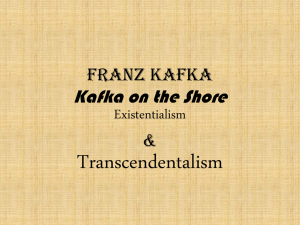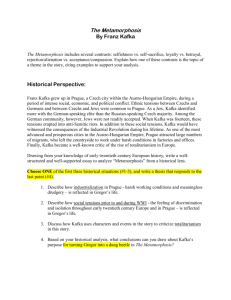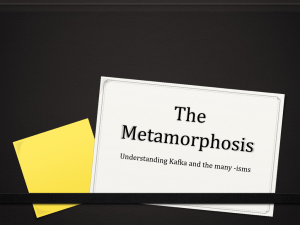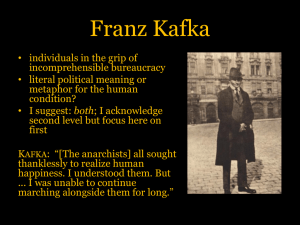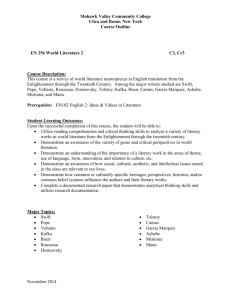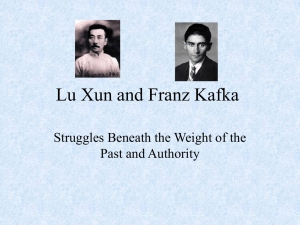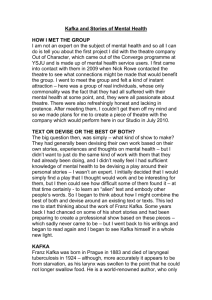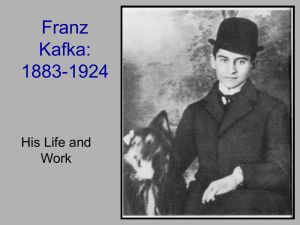HONR 348K Syllabus - University Honors
advertisement
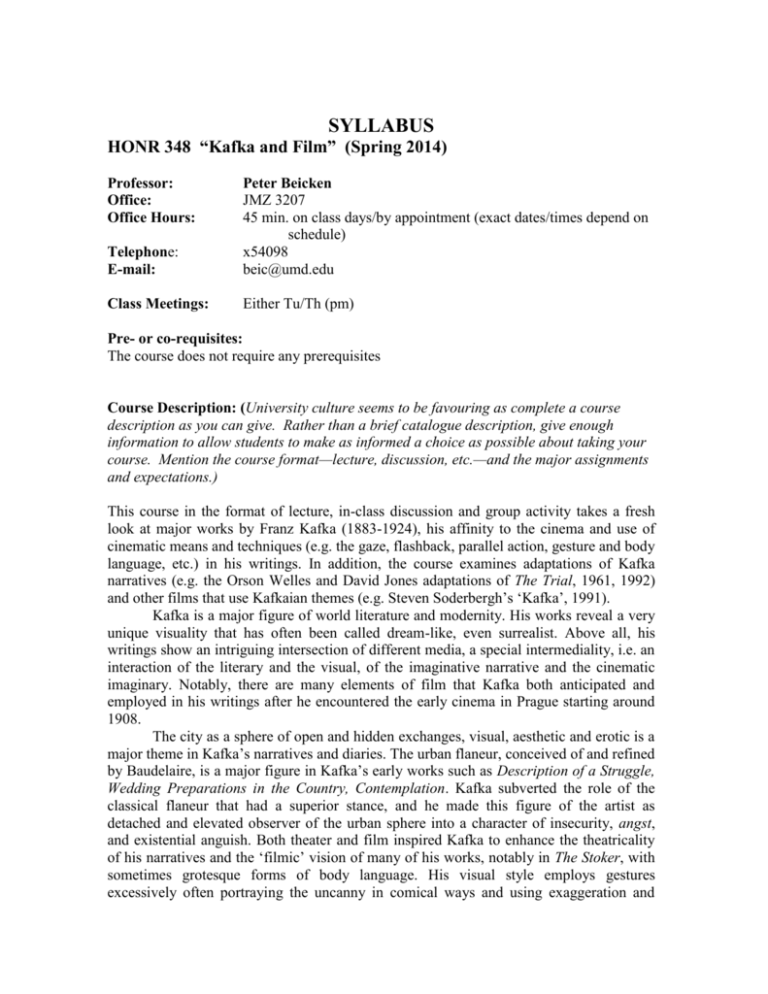
SYLLABUS HONR 348 “Kafka and Film” (Spring 2014) Professor: Office: Office Hours: Telephone: E-mail: Peter Beicken JMZ 3207 45 min. on class days/by appointment (exact dates/times depend on schedule) x54098 beic@umd.edu Class Meetings: Either Tu/Th (pm) Pre- or co-requisites: The course does not require any prerequisites Course Description: (University culture seems to be favouring as complete a course description as you can give. Rather than a brief catalogue description, give enough information to allow students to make as informed a choice as possible about taking your course. Mention the course format—lecture, discussion, etc.—and the major assignments and expectations.) This course in the format of lecture, in-class discussion and group activity takes a fresh look at major works by Franz Kafka (1883-1924), his affinity to the cinema and use of cinematic means and techniques (e.g. the gaze, flashback, parallel action, gesture and body language, etc.) in his writings. In addition, the course examines adaptations of Kafka narratives (e.g. the Orson Welles and David Jones adaptations of The Trial, 1961, 1992) and other films that use Kafkaian themes (e.g. Steven Soderbergh’s ‘Kafka’, 1991). Kafka is a major figure of world literature and modernity. His works reveal a very unique visuality that has often been called dream-like, even surrealist. Above all, his writings show an intriguing intersection of different media, a special intermediality, i.e. an interaction of the literary and the visual, of the imaginative narrative and the cinematic imaginary. Notably, there are many elements of film that Kafka both anticipated and employed in his writings after he encountered the early cinema in Prague starting around 1908. The city as a sphere of open and hidden exchanges, visual, aesthetic and erotic is a major theme in Kafka’s narratives and diaries. The urban flaneur, conceived of and refined by Baudelaire, is a major figure in Kafka’s early works such as Description of a Struggle, Wedding Preparations in the Country, Contemplation. Kafka subverted the role of the classical flaneur that had a superior stance, and he made this figure of the artist as detached and elevated observer of the urban sphere into a character of insecurity, angst, and existential anguish. Both theater and film inspired Kafka to enhance the theatricality of his narratives and the ‘filmic’ vision of many of his works, notably in The Stoker, with sometimes grotesque forms of body language. His visual style employs gestures excessively often portraying the uncanny in comical ways and using exaggeration and excess to ridicule the petrified, oppressive orders of patriarchy and authoritarian rule of what Walter Benjamin called Kafka’s “world of fathers”. Kafka’s works inspired film adaptations such as Welles’ The Trial and Jones’ The Trial (scripted by Harold Pinter). Both are fascinating cinematic meditations on Kafka’s most enigmatic novel that presents a puzzling tale about Josef. K. who is an accused man struggling with an invisible, mysterious court. Other confrontations between protagonist and the hostile environment of a counterworld include Kafka’s stunning stories The Metamorphosis, The Judgment, A Country Doctor (adapted by Cyril Tuschi, Nightland, 1985), The Hunger Artist, and Kafka’s final novel, The Castle. Michael Haneke adapted this labyrinthian tale about an unending quest for acceptance in his avant-garde film The Castle (1997). For today’s students who grow up in a predominantly visual culture and are inundated with a flood of images, a course like “Kafka and Film” serves as an introduction to the intriguing intersection of the literary imagination and the cinematic imaginary. They are led to explore how Kafka’s innovative uses of the visual are akin to or influenced by cinema. Usually, students are keen on film as ‘the movies’ mean easy entertainment. However, Kafka’s use of the cinematic enhances the visual culture of his own writing (and of film) with an distinct sense of art and meaning which represent complex systems of signification. Experience with this course has shown that students are intrigued by the interaction of the media. They are fascinated with the power and artistic depth the intermediality of Kafka’s writing creates through the multi-layered interplay of the literary and the cinematic. Course Goals/LOAs: This course aims to familiarize students with a major writer of modernity, Franz Kafka, whose love for and use of the visual and film created innovative interplays of the different media. Students will also be introduced to the basics of film studies, major theories as well as key concepts for analysis and interpretation. They will be prepared and trained to understand the complexities and ramifications of intermediality, i.e. the interaction of the literary imagination bent on the visual and the cinematic imaginary that creates the appearance of tangible realities on screen. In addition, students will explore the more traditional relationship of literature and film: the adaptation of literary works. By the end of this course students can expect to be able to understand the major differences and commonalities between literary works and films. Having learned new theoretical concepts for media-specific inquiries and having practiced analysis and interpretation, they will be able to appreciate the intricacies of the intermedial. They will also be able to articulate their insights intelligently and communicate their findings with appropriate skill. Grading: (for example) 20% participation in class 10% oral presentation in class (in teams and individually) 15% quizzes, in-class assignments, etc. 25x% term paper 10% midterm exam 20% final exam (cumulative) Grading Scale: Normal grading scale (A+ 100-98, A 97-93, A- 92-90 etc. F 59-0) Course materials: Textbooks required: 1. Franz Kafka, The Complete Stories. Ed. Nahum Glatzer. New York: Schocken Books. 1995 (ISBN 0-8052-1055-5) $15,- (CS) 2. Franz Kafka, Diaries 1910-1923. New York: Schocken Books, 1988. (ISBN 0-8052-0906-9) $16,- (D) 3. Franz Kafka: The Trial. (New tr. Breon Mitchell) NY: Schocken Books, 1999. (ISBN 0-80520999-9) $13,-(T) 4. Franz Kafka: The Sons. New York: Schocken Books, 1989. (ISBN 0-8052-0886-0) $11.95 (So) 5. Franz Kafka: The Castle. (New tr.By Mark Harman).NY: Schocken Books.1998(ISBN 08052-1106-3) $14,- (C) In addition, chapters/excerpts from critical works will be put on ELMS/CANVAS): 1. Robert Alter: Imagined Cities. Urban Experience and the Language of the Novel. 2003. 2. Mark Anderson: Kafka’s Clothes. Ornament and Aestheticism in the Habsburg Fine de Siecle. 1992. 3. Charles Baudelaire. The Painter of Modern Life and other Essays. 1995.. 4. Peter Beicken: Franz Kafka. The Trial (“Der Process.”) Interpretation. 2005. Here: pp. 162-171 5. Walter Benjamin. “The Return of the Flaneur.” 1928. “Kafka” 1934. 6. Timothy Corrigan (ed.). Film and Literature: An Introduction and Reader. 22011. 7. Carolin Duttlinger: Kafka and Photography, 2007. 8. Susan Hayward. Cinema Studies. The Key Concepts. 32006. 9. Ritchie Robertson. Franz Kafka. Introduction. 2004. 9. Georg Simmel, The Metropolis and the Mental Life. Sociology of Georg Simmels. 1950. 10. Alan Spiegel: Fiction and the Camera Eye. Visual Consciousness in Film and the Modern Novel. 1976. 11. Gregory Woods: A History of Gay Literature. The Male Tradition. 1998. 12. Hanns Zischler: Kafka Goes to the Movies. 2003. 13. A Franz Kafka encyclopedia. 2005. Schedule : Please include daily/weekly readings as well as a thematic progression and due dates for major assignments. Week 1 Franz Kafka. Introduction. Th Goals of the course; first handouts; Clothes, On the Tram. The urban flaneur: . (Baudelaire, Simmel, Benjamin) Week 2 Tu Contemplation (CS): Clothes, On the Tram, Confidence Trickster (Anderson) Th The Tradesman, Window Gazing, Rejection (Robertson) Week 3 Tu Description of a Struggle (CS); ‘cruising the city’: flanerie, alienation, gender confusion (Woods) Th Wedding Preparations in the Country (1st ms; CS); work and the isolated self Week 4 Tu Wedding (cont.); Unhappiness (CS). The Urban World (Diaries=D, 40-45) Introduction of the father figure (Benjamin) Th The Stoker (from ‘America’), (So) Cinematic vision and authority figures, family (Duttlinger, Zischler) Week 5 Tu The Judgment (So): Father-son conflict; patriarchal rule (Benjamin) Th The Metamorphosis (So): Family and fantasy (Anderson) Week 6 Tu The Trial: ‘The Arrest’ (Chap. 1) Partial screening of Orson Welles & David Jones, The Trial. (Alter, Beicken) Th The Trial: Chap 2-5. Fragment: ‘Public Prosecutor’ (Hayward) Week 7 Tu The Trial: Chap 6-9; ‘Before the Law’ Th Chap., 10; Fragment: ‘The Building / House’ (Midterm, takehome, due Week 8) Week 8 Tu Orson Welles, The Trial. Screening (Spiegel) Th Welles, Trial, dis. (Midterm due) Spring Break Week 9 Tu David Jones, The Trial (Corrigan) Th Jones, Trial, dis. Comparison with Welles (Hayward) (hand out topics for paper, due Week 10) Week 10 Tu In the Penal Colony (CS) Th A Report to an Academy (CS) Week 11 Tu Up on the Gallery (CS); A Country Doctor (CS) Th Cyril Tuschi, Nightland (adaptation of A Country Doctor) (outline for paper due) Week 12 Tu Prometheus, Poseidon, Silence of the Sirens (CS) Th The Castle: Chap. 1-3 Week 13 Tu The Castle: Chap. 4-10 Th The Castle: Chap. 11-15 Week 14 Tu Michael Haneke, The Castle (partial screening & dis.) (Corrigan) Th A Hunger Artist (CS) ( paper due) Week 15 Tu Steven Soderbergh, Kafka (screening; self-assessment of your oral participation due) Th Steven Soderbergh, Kafka (dis.) – Conclusion (hand in anonymous evaluation of/comments about course) Final Exam: Follows the schedule of classes for the assigned final exam time. Make-up Policy: students who miss the regular final with an acceptable excuse can take a make-up exam at an agreed upon date and time. University Policies: The course follows all applicable University Policies such as: 1. Students with disabilities should contact the instructor at the beginning of the semester to discuss any accommodation for this course. 2. The University has approved a Code of Academic Integrity (http://www.shc.umd.edu/code.html) which prohibits students from cheating on exams, plagiarizing papers, submitting the same paper for credit in two courses without authorization, buying papers, facilitating academic dishonesty, submitting fraudulent documents, and forging signatures. Plagiarism policy: all quotations taken from other authors, including from the Internet, must be indicated by quotation marks and referenced. Paraphrasing must be referenced as well. The following University of Maryland Honor Pledge, approved by the University Senate, should be handwritten and signed on the front page of all papers, projects or other academic assignments submitted for evaluation in this course: "I pledge on my honor that I have not given or received any unauthorized assistance on this assignment/examination." 3. Religious observance: Please inform your instructor of any intended absences for religious observance well in advance. http://www.umd.edu/catalog/index.cfm/show/content.section/c/27/ss/1584/s/1540 4. Regular attendance and participation in this class is the best way to grasp the concepts and principles being discussed. However, in the event that a class must be missed due to an illness, the policy in this class is as follows: For every medically necessary absence from class (lecture, recitation, or lab), a reasonable effort should be made to notify the instructor in advance of the class. When returning to class, students must bring a note identifying the date of and reason for the absence, and acknowledging that the information in the note is accurate. If a student is absent more than ___ time(s), the instructor may require documentation signed by a health care professional. If a student is absent on days when tests are scheduled or papers are due [or other such events as specified in the syllabus] he or she is required to notify the instructor in advance, and upon returning to class, bring documentation of the illness, signed by a health care professional. 5. Unless otherwise directed, students are expected to remain in the classroom for 15 minutes in the unlikely event that the instructor should not arrive on time. After 15 minutes, it may be assumed that class will not be held. 6. In case of inclement weather: please be specific about procedures; see the faculty handbook: http://www.faculty.umd.edu/teach/attendance.html 7. Course evaluations are a part of the process by which the University of Maryland seeks to improve teaching and learning. Results are also used for promotion and tenure decisions. Your participation in this official system is critical to the success of the process. All information submitted to CourseEvalUM is confidential. Instructors and administrators can only view group summaries of evaluations. Instructors and college administrators cannot identify which submissions belong to which students. Participating ensures that your opinions will count. By completing all of your evaluations, you will be able to see all campus results posted to Testudo in January or June. 8. This syllabus may be subject to change. Students will be notified in advance of important changes that could affect grading, assignments, etc.
